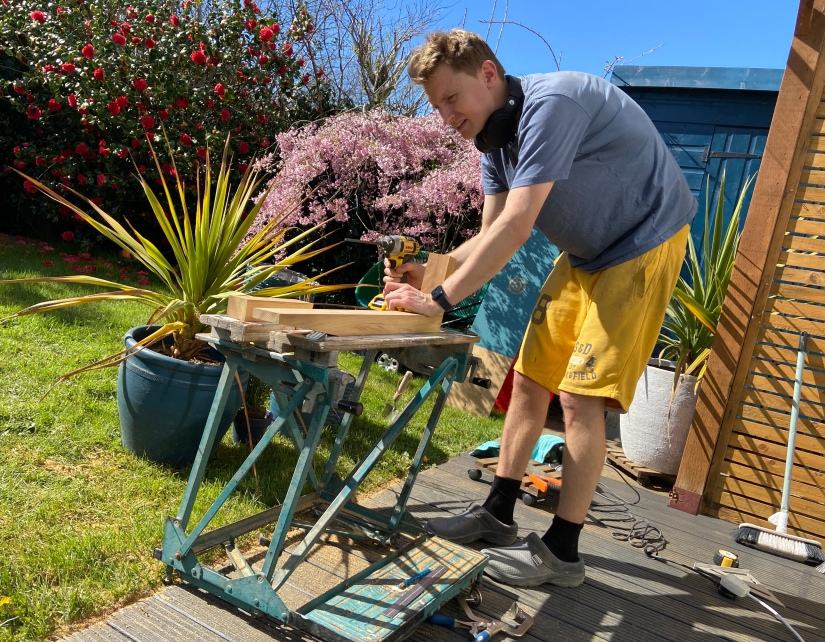What does it mean to be a handyman? What jobs do handymen do? Can handymen do everything? These are all good questions that get asked when homeowners or business owners need specific tasks completed for renovations and repairs.

Introduction
At its core, a handyman is a skilled individual equipped with a diverse set of abilities to tackle a wide array of tasks. From minor repairs to comprehensive renovations, handymen are the go-to experts for addressing the myriad issues that can arise in domestic and commercial spaces.
The importance of handymen is evident in maintaining the functionality and appearance of our homes and workplaces. Homeowners and business owners often face various tasks, and handymen play a crucial role in addressing these issues. Whether it’s fixing a leaky faucet, performing routine maintenance, or handling more extensive projects, handymen are essential for property care. Their contributions not only ensure the durability of structures but also improve the overall quality of life for occupants.
The Role of a Handyman
Overview of the Broad Scope of Handyman Jobs
A handyman is a skilled professional who possesses a diverse set of abilities, making them invaluable in various aspects of home maintenance and improvement. Their role is characterised by adaptability and the capability to tackle a wide array of tasks around the house. From minor repairs to more extensive projects, handymen serve as versatile problem-solvers, ensuring that homes remain in optimal condition.
Examples of Common Tasks
Handymen excel in performing a multitude of tasks, demonstrating their expertise in both simple fixes and more complex renovations. Some common tasks include:
- Laying Tile: Handymen are skilled in tile installation, enhancing the visual appeal of areas such as kitchens, bathrooms, and floors.
- Carpentry: A cornerstone of a handyman’s expertise lies in carpentry. From constructing shelves to repairing furniture and framing structures, handymen can showcase craftsmanship in their carpentry skills, enhancing the functionality and aesthetics of living spaces.
- Drywall Installation: Skilled in the art of drywall installation, handymen can repair or install drywall, providing a smooth and polished finish to interior spaces.
- Repairing Damaged Gutters: Maintaining the integrity of gutters is crucial for preventing water damage to a home. Handymen are adept at repairing damaged gutters, ensuring effective water drainage.
- Electrical Repairs: Handymen are often skilled in handling minor electrical repairs, such as fixing outlets, switches, or wiring issues. While they may not tackle major electrical projects, they can address common household electrical problems.
- Patching and Painting: From small wall blemishes to entire room repaints, handymen possess the skills to patch imperfections and apply a fresh coat of paint, revitalising the aesthetics of any space.
- Deck Construction and Repair: Building and repairing decks require a combination of carpentry skills and structural knowledge, areas in which handymen excel. They ensure that decks are not only aesthetically pleasing but also safe and durable.
- Furniture Assembly: Handymen excel at assembling furniture, providing a convenient solution for homeowners who prefer to avoid the challenges of deciphering complex assembly instructions.
- Window and Door Repairs: Whether it’s fixing a squeaky hinge, addressing drafts, or repairing a broken latch, handymen can handle a variety of issues related to windows and doors.
- Cabinet Installation and Repairs: Handymen can install new cabinets or repair existing ones, contributing to both the functionality and aesthetics of kitchens, bathrooms, and other spaces.
- Plumbing: Handymen are equipped to handle various plumbing issues, from fixing leaks to installing new fixtures. Their expertise ensures that water-related problems are promptly addressed.
- Weather Stripping Installation: Improving energy efficiency is a common concern for homeowners. Handymen can install weather stripping around doors and windows, helping to reduce drafts and energy consumption.
- Fence and Gate Repairs: Repairing damaged fences or gates is another task in which handymen demonstrate their expertise, ensuring the security and privacy of a property.
- Pressure Washing: Handymen can use pressure washing equipment to clean exterior surfaces such as decks, driveways, and siding, revitalising the appearance of a home.
- Minor Roof Repairs: While major roof work may require specialised professionals, handymen can handle minor roof repairs such as fixing leaks, replacing shingles, or addressing small damages.
- Fixture Replacement: Whether it’s replacing a malfunctioning light fixture or updating bathroom accessories, handymen handle fixture replacements with precision and attention to detail.
- Caulking and Sealing: Handymen are proficient in applying caulk and sealants to areas such as windows, doors, and bathrooms, preventing water infiltration and improving insulation.
- Appliance Installation and Repairs: Installing new appliances or repairing minor issues with existing ones falls within the skill set of handymen, providing homeowners with a one-stop solution for household maintenance.
- General Maintenance: Beyond specific tasks, handymen excel in routine maintenance, addressing a wide range of issues to keep a home in excellent condition.
Further Examples of Handyman Skills and Jobs
- Kitchen and Bathroom Upgrades: Handymen are skilled in facilitating kitchen and bathroom upgrades, transforming these essential spaces into stylish and functional areas. From installing new fixtures and appliances to revamping cabinetry and countertops, handymen bring a blend of craftsmanship and practicality to enhance the heart of any home.
- Flooring Installation: Whether it’s hardwood, laminate, tile, or vinyl, handymen possess the expertise to handle various types of flooring installations. Their attention to detail ensures a seamless and aesthetically pleasing result, elevating the overall look and feel of living spaces.
- Cabinetry: Handymen are adept at cabinetry work, offering services that range from repairing and refinishing existing cabinets to designing and installing new ones. This skill enhances both the functionality and visual appeal of kitchens, bathrooms, and other storage spaces within a home.
C. Outdoor Maintenance
- Deck Repairs: Outdoor living spaces often require maintenance, and handymen excel in deck repairs. Whether it’s fixing structural issues, replacing damaged boards, or applying a fresh coat of protective finish, handymen ensure that decks remain safe, functional, and visually appealing.
- Fence Installation: Handymen are proficient in fence installation, providing privacy and security to residential properties. From designing and constructing new fences to repairing and reinforcing existing ones, handymen contribute to the overall aesthetics and safety of outdoor spaces.
- Lawn and Garden Care: Beyond structural elements, handymen extend their expertise to outdoor landscapes. They can handle various lawn and garden care tasks, including mowing, trimming, planting, and general landscaping maintenance. This ensures that the exterior of a home is as well-kept as its interior, creating a harmonious and inviting environment.

The Limits of a Handyman
While handymen are versatile professionals capable of handling a broad spectrum of tasks, there are certain specialised projects that may fall beyond their expertise. Recognising these limits is crucial for ensuring the successful completion of specific tasks within a home.
- When to Hire a Specialist: There are instances when a project demands the expertise of a specialised professional. Complex electrical work, major plumbing overhauls, or intricate structural changes often require the skills of a specialist. Knowing when to hire a professional in a specific field ensures that the task is completed safely and according to industry standards.
- Recognising Projects Beyond a Handyman’s Expertise: Handymen excel in general repairs, maintenance, and smaller-scale projects. However, projects involving intricate design, architectural changes, or compliance with specific building codes may surpass their capabilities. Recognising the complexity of a task and understanding when to seek the services of a specialist guarantees that projects are undertaken by professionals with the requisite knowledge and skill set.
Handyman Insurance: Essential Protection
Handymen, vital for home maintenance, should prioritise comprehensive insurance, especially public liability coverage. Public liability insurance safeguards handymen from accidental damage or injuries during work, covering legal and medical expenses.
Recommended Coverage: £1,000,000
A minimum public liability coverage of £1,000,000 is advised. This level addresses potential claims and associated costs, providing a financial safety net for unexpected incidents during repair jobs or property maintenance.
When Hiring a Handyman, Inquire About Insurance
If hiring a handyman, inquire about their insurance coverage, particularly public liability. Knowing their coverage ensures professionalism and accountability. Confirming appropriate insurance provides confidence and peace of mind for both the handyman and the client during home improvement projects.

Hiring a Handyman: Choosing Reliability
When selecting a handyman for your home projects, it’s crucial to ensure reliability and competence. Here are key tips to guide you in making the right choice:
- Checking References: Seek references from previous clients to gauge the handyman’s track record. Reviews and testimonials provide insights into their work quality, reliability, and professionalism. A reputable handyman will readily offer references, allowing you to make an informed decision.
- Evaluating Experience and Skill Set: Assess the handyman’s experience and skill set. A seasoned professional will have a diverse range of skills, ensuring they can handle various tasks with proficiency. Look for evidence of past projects or inquire about their expertise in areas relevant to your needs.
- Discussing Rates and Estimates: Before committing, openly discuss rates and estimates. A transparent conversation about costs ensures there are no surprises down the line. Reputable handymen provide clear, detailed estimates, giving you a realistic expectation of the financial aspects of your project.
By checking references, evaluating experience, and discussing rates upfront, you can confidently choose a reliable handyman who aligns with your project requirements and expectations.
Conclusion
In conclusion, handymen emerge as indispensable assets for homeowners and business owners alike. Their versatility, showcased through a diverse skill set, positions them as problem-solvers capable of tackling a myriad of tasks, from general repairs to intricate renovations. As we’ve explored the broad scope of their capabilities, it becomes evident that handymen play a pivotal role in maintaining, enhancing, and transforming spaces.
For homeowners and business owners seeking efficient solutions to their maintenance and improvement needs, the choice is clear—utilise the services of a handyman. With their expertise, reliability, and commitment to quality work, handymen offer a convenient and comprehensive approach to keeping homes and businesses in optimal condition. Embracing the versatility of handymen ensures that every project, big or small, is met with skill, precision, and the assurance of a job well done. Make the most of the invaluable services handymen provide and elevate the functionality, aesthetics, and longevity of your spaces.





